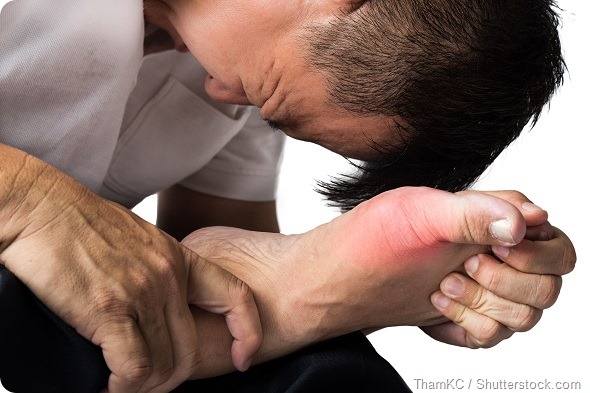Research, published today, has shown that an acute gout attack is more than twice as likely to occur during the night or early morning hours as during the day. The increased prevalence of gout attacks at night time was observed even after 24 hours with no alcohol and low purine intake.
Gout is the most common inflammatory arthritis, affecting around 8.3 million Americans. Acute gout flares are the extremely painful consequence of uric acid crystals forming within joints. Uric acid is a natural by-product of the metabolism of ingested purines, which are found naturally in most foods (and within cells of the human body). Purines occur in particularly high concentrations in organ meat, seafood, and alcohol (yeast).

The Boston Online Gout Study followed 724 patients with gout for a year between 2003 and 2013 to identify possible triggers for gout attacks. Participants recorded the date and hour at which a gout attack occurred, giving details about their exact symptoms, medication use, and certain risk factors (such as alcohol use and seafood consumption) during the 24 hours and 48 hours preceding the gout flare.
During the study, participants experienced 1,433 gout attacks, 733 of which occurred between midnight and 07:59, 310 between 08:00 and 14:29, and 390 between 15:00 and 23:59. Compared with daytime hours, gout flares were almost two and a half times more common during the night and 1.3 times more common in the evening.
Although 68% of the participants had consumed alcohol prior to a gout flare, researchers found that the increased risk of a gout flare at night persisted even among those who had no alcohol intake and a low intake of purines during the 24 hours prior to the gout attack.
Lead author Dr Hyon Choi commented:
Our findings provide the first prospective evidence that the risk of gout flares is higher during the night and early morning hours than during the day...It is speculated that lower body temperature, night time dehydration, or a nocturnal dip of cortisol levels may contribute to the risk of gout attacks at night.
Gout prophylactic measures may therefore need to target such nocturnal changes in order to effectively prevent gout flares.
Source:
Choi HK, et al. Nocturnal Risk of Gout Attacks. Arthritis & Rheumatology 2014. Epub ahead of print. Available at http://doi.wiley.com/10.1002/art.38917